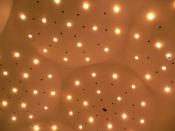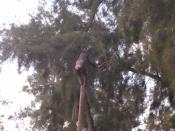Intelligence can be interpreted in many different ways, whether it is in school, work, or at home. Cleverness can be used to solve a problem or a crisis. Mai Vo-Dinh, in her story "The fly" uses a young boy to represent perspicacity. The young boy uses that perspicacity to get out of a crisis. He utilizes this intelligence to trick a rich man which results in resolving his family's problem.
The young boy's intelligence is made use of in many different ways in order to fool the rich man. When the rich man asked the child where his parents were, he replied "Well, sir, my father has gone to cut living trees and to plant dead ones and my mother is at the market-place selling the wind and buying the moon" (104). The young boy did not inform the rich man where his parents exactly were, therefore, he did not lie about where his parents were either.
The boy left the rich man in thoughts because he did not understand what the boy was talking about. The boy demonstrates his strongest attribute by deceiving the rich man by making him blurt out that "the fly was not on my nose; he was on the housepole" (106). When he mentioned that in court, it clarified that he had made a promise to the young boy. The peasant couple does not pay off any debt to any further extent because the boy ended up deceiving the old man into saying that he made a promise. He illustrates his astuteness by accepting the promise because he knew he could figure something out at the right time "A fly is a good enough witness for me" (105). If there was no promise accepted, the peasant couple would still have to pay off their...


